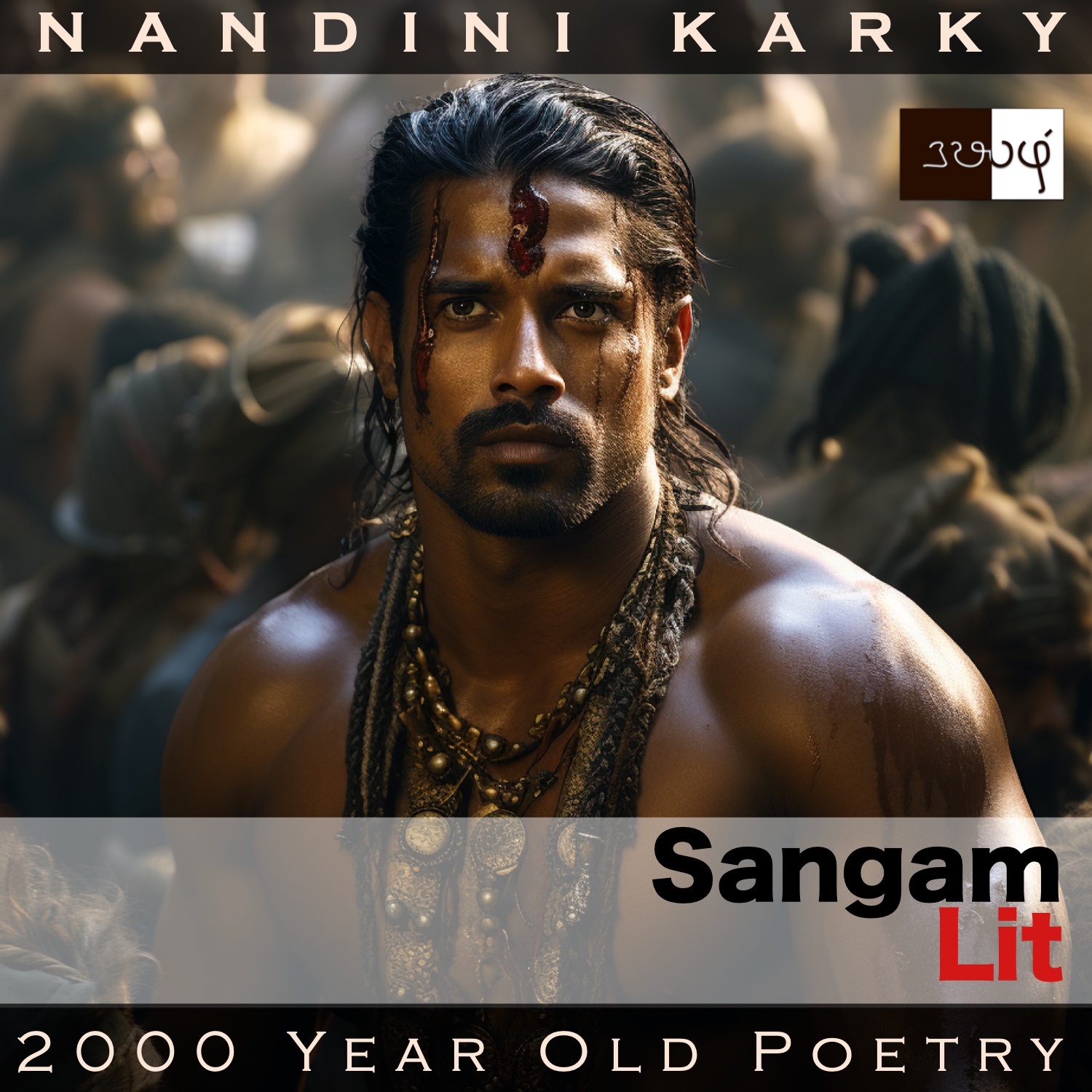Podcast: Play in new window | Download
Subscribe: Apple Podcasts | Spotify | Amazon Music | Android | iHeartRadio | TuneIn | RSS | More
In this episode, we observe the events after a warrior’s fall in the field, as depicted in Sangam Literary work, Puranaanooru 285, penned by the poet Arisil Kizhaar. Set in the category of ‘Vaagai Thinai’ or ‘Victory’, the verse etches the noble virtues of a leader.

பாசறையீரே! பாசறையீரே!
துடியன் கையது வேலே; அடிபுணர்
வாங்குஇரு மருப்பின் தீந்தொடைச் சீறியாழ்ப்
பாணன் கையது தோலே; காண்வரக்
கடுந்தெற்று மூடையின் ……..
வாடிய மாலை மலைந்த சென்னியன்;
வேந்துதொழில் அயரும் அருந்தலைச் சுற்றமொடு
நெடுநகர் வந்தென விடுகணை மொசித்த
மூரி வேண்டோள் ……..
சேறுபடு குருதிச் செம்மலுக் கோஓ
மாறு செறு நெடுவேல் மார்புளம் போக
நிணம்பொதி கழலொடு நிலம் சேர்ந்தனனே;
அது கண்டு, பரந்தோர் எல்லாம் புகழத் தலைபணிந்து
இறைஞ்சியோனே குருசில், ‘பிணங்கு கதிர்
அலமரும் கழனித் தண்ணடை ஒழிய,
இலம்பாடு ஒக்கல் தலைவற்கு ஓர்
கரம்பைச் சீறூர் நல்கினன்’ எனவே.
One of those verses with missing lines and yet many details. The poet’s words can be translated as follows:
“Hear ye, those in the encampment! Hear ye, those in the encampment! The spear is in the hand of the drummer; The shield is in the hand of the bard, holding a sweet-stringed, small lute with a huge, curved and well-tied bottom; Appearing akin to densely tied-up sacks… (Missing lines) the leader with a faded garland.
Akin to a king who arrives at his tall mansion surrounded by his wise counsel, was his strong chest surrounded by the fleeting arrows from enemy hands. Alas, and so, flowed into the mud, the blood of the great leader!
As that raging tall spear thrown with enmity pierced his chest, with fatty guts of foes around his anklets, he fell to the ground. Seeing this, those who were knowledgeable praised him. The humble lord bent his head, in response to their words, which proclaimed that, ‘As all the moist and fertile farmlands filled with swaying stalks of crops were already given away by him previously to others, to that poor supplicant with a huge family, he rendered a small town with a hard soil!’”
The poet starts by addressing those in the battle camps, informing them that the spear was now in the drummer’s hand and that the shield was in the bard’s hand. These proclamations may not sound meaningful to us, somewhat like how a spirited commentary on a cricket match would sound to someone who does not follow the game. However, the message being conveyed is that the warrior who held that spear and shield had now fallen and that’s why these battle weapons are in the hands of those non-participating persons on the fringes of the battlefield. The poet makes a comment about mounds of densely packed sacks but the lines that follow are missing. This can be understood possibly as a simile for the mounds of enemy corpses that this warrior has left behind in the battlefield.
Then, the poet shifts the spotlight on the faded garland around this hero’s neck, and afterwards on his wide chest stitched with enemy arrows. In another Puranaanooru poem, we saw how this image was compared to the spokes of a wheel. Here, for the same image, the poet brings in the unique simile of a king surrounded by his council of ministers. Poetic elements apart, that warrior with arrows on his chest is shedding blood onto the ground beneath his feet. Following this, as another tall spear pierces his chest, with the guts of enemy soldiers around his feet, he falls to the ground. Seeing this sight, knowledgeable people surround him and sing his praises saying how after giving away all the rich agricultural towns to others, when another supplicant arrived at his door, the leader granted him a small but not so fertile town, implying that he could never say no to someone who came seeking to him. Hearing such praises, the leader in question bent his head in modesty, even at those final moments of his life, the poet concludes.
A verse that etches the courage, generosity and modesty of a leader in a single verse. The highlight here is in how the leader does not beat his chest in pride as everyone sings his praises, but bows his head low, deflecting those compliments. This goes on to show the implicit understanding in Sangam times that to be virtuous was to offer humility in response to praises, at times, refusing even to accept those celebratory words – a culture trait observed in many Eastern cultures to this day!




Share your thoughts...